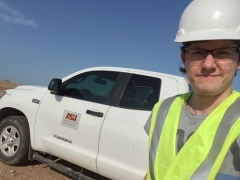PhD grad hopes to further research on terrestrial air quality, atmospheric expertise at NASA
Editor's note: This story is part of a series of profiles of notable spring 2023 graduates.
Jason Miech, a PhD student of environmental analytical chemistry in the School of Molecular Sciences, is graduating this spring after an academic career of research focusing on atmospheric chemistry, including a study on the effect of COVID-19 travel restrictions on Phoenix air quality.
His advisor, Pierre Herckes, stated, “Jason was a very productive graduate student, working on a variety of research topics during his PhD, all related to air quality. He had just started when COVID-19 hit and took the idea of what is going on with air quality data during the lockdown to make a very unique air quality study that actually considered annual changes in meteorology and looked beyond (overly) simplistic views of impact. His findings resulted in a paper that found applications beyond Phoenix because of the scientific rigor.”
Miech also worked on an applied project in collaboration with Maricopa County to calibrate low-cost sensors for nitrogen dioxide (NO2) measurements and apply them to extend the coverage of measurements locally, in support of air quality networks, resulting in two more manuscripts. He also worked on testing the efficacy of dust control techniques, work that was featured in a local newspaper.
RELATED: 'A tipping point': Arizona universities join forces to map the deadly Valley fever fungus
Additionally, Miech just wrapped up a project that he largely led on tire-wear emissions and their variability, handling challenging logistics, coordinating many students in the field and doing novel science. The approach he developed and its results are hoped to be very useful for local agencies and the scientific community.
Miech will continue his research career as a postdoctoral researcher, after which he hopes to work for NASA in its Earth Science Division.
Question: What was your “aha” moment when you realized you wanted to study the field you majored in?
Answer: I have been interested in environmental analytical chemistry for a while, but it was only during the first-year student seminar when Dr. Pierre Herckes talked about dust storms that I became aware of the broad field of atmospheric chemistry. This fascination was further strengthened in Dr. Herckes' Chemistry of Atmospheres class where we covered a variety of topics from climate change to photochemical reaction kinetics.
Q: What’s something you learned while at ASU — in the classroom or otherwise — that surprised you or changed your perspective?
A: One thing that surprised me at ASU was the collaborative nature between graduate student and advisor. While my advisors would help come up with plans concerning the project's big picture, it was up to me to fill in the knowledge gaps, and I was given plenty of room to focus on questions that I was interested in answering.
Q: Why did you choose ASU?
A: For graduate school I knew it was important to study at a larger research institution with a variety of high-tech instrumentation facilities and collaboration opportunities. Coming from New England I was also really interested in the Phoenix area and the surrounding mountainous and desert landscape and looked forward to the new experiences available to me in the Southwest.
Q: Which professor taught you the most important lesson while at ASU?
A: Dr. Pierre Herckes really helped improve my presenting and writing skills by emphasizing the need to tell a story with your research. By connecting your results to the larger picture, you can more easily capture and retain the audience's attention. This also helps to streamline your work by only focusing on points that make sense within your storyline.
Q: What’s the best piece of advice you’d give to those still in school?
A: I'd pass on the advice my DjaDja (grandfather), a former professor at Brown University, gave me, which was "four hours a day." He would often hold up four fingers to me and ask if I've done my four hours. What he meant was additional studying and reading on top of any school-assigned work I had been given. While I rarely reached the full four hours, the sentiment of putting in some extra work to further your understanding just a little bit more has stuck with me.
Q: What was your favorite spot on campus, whether for studying, meeting friends or just thinking about life?
A: My favorite spot on campus has to be the first two floors of ISTB4. I love seeing the mock-ups of the Psyche, Ingenuity and Perseverance spacecrafts in the lobby and the meteorite collection on the second floor. It is definitely inspirational to see the science being done on other worlds.
Q: What are your plans after graduation?
A: I plan to do a postdoc focused on researching air quality and atmospheric chemistry as I really enjoyed the research I was able to work on at ASU. Someday I'd love to work at NASA in their Earth Sciences Division.
Q: If someone gave you $40 million to solve one problem on our planet, what would you tackle?
A: While there are many problems that could use funding, I would focus on improving air quality in Africa, where air pollution is the second leading risk factor for death across the continent. This is in part due to the heavy use of solid fuels for cooking and lack of air quality standards and monitoring sites. The implementation of alternative energy sources and low-cost air quality sensors could greatly reduce air pollution.
